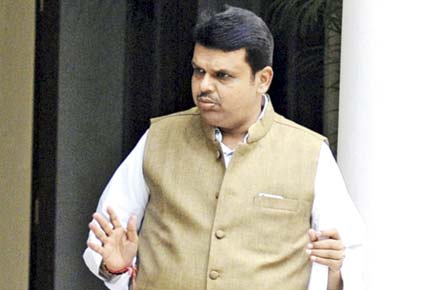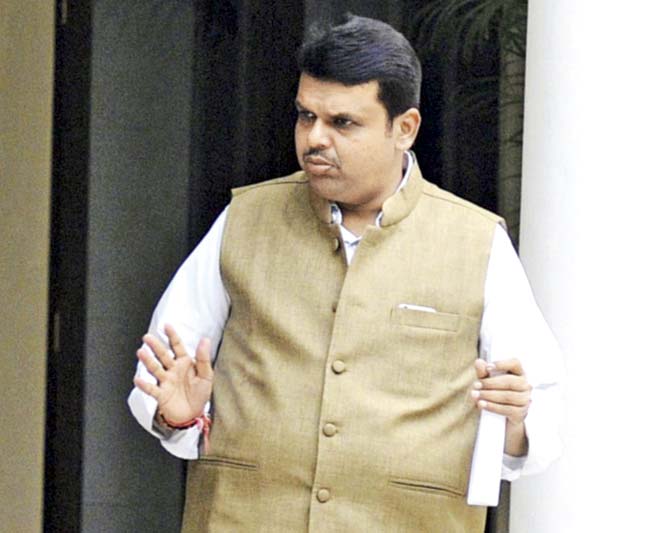Netas, bureaucrats and other sundry rulers are notoriously hard to bring to book; their power, money, position and connections protect them

 Netas, bureaucrats and other sundry rulers are notoriously hard to bring to book; their power, money, position and connections protect them. But they continue to feel insecure. The fear of the fall from high is so strong that, by hook or by crook, they must make the fortress stronger.
Netas, bureaucrats and other sundry rulers are notoriously hard to bring to book; their power, money, position and connections protect them. But they continue to feel insecure. The fear of the fall from high is so strong that, by hook or by crook, they must make the fortress stronger.
ADVERTISEMENT

The Chief Minister could have signalled his honest intention to clean up the Augean stables by doing nothing more than giving a nod for prosecutions to go forward. File pic
Any hope that new brooms in Maharashtra would sweep away the filth of corruption that is choking governance can now be laid to rest by the cabinet decision of June 9 this year. Going well beyond accepted limits and against a pile of Supreme Court judgements, the decision will make it even more difficult than it is now to bring public servants accused of corruption and other grave crimes to justice. The decision, in effect, says that if a public servant is accused of corruption or torture, no further steps can be taken to investigate unless permission is given by the government. Registering a First Information Report where serious crimes are alleged is a mandatory duty of the police. Yet the cabinet decision seems to take away the right to even get a First Information Report lodged without taking permission. No matter how strong the allegations, the investigating agency will not be able to begin even a preliminary inquiry, let alone go on to investigate the suspect.
To protect public servants from falling victim to frivolous and vexatious complaints as they go about their duty, the Criminal Procedure Code and the Prevention of Corruption Act already requires that in some circumstances — mind you, in some very limited circumstances — prior sanction should be asked for before they can be prosecuted. Investigations can take place but moving further to prosecution needs the government’s assent.
Over years, this protection has been abused by taking forever to give permissions or by denying it altogether without giving open and clear reasons for such denials. Bureaucrats and other functionaries have gone on to promotions and comfortable retirements despite fearsome allegations swirling around their names. The armed forces, the police and other paramilitaries have hidden behind the provision to avoid being brought to book for torture, rape and murder. The courts have tried to whittle down the protection by repeatedly pointing out that there is no need to seek government sanction for prosecution in such cases because it is in no part of anyone’s duty to indulge in obviously criminal activities. Trying to put a stop to the ruse of undue delay in giving sanction, the courts have laid down that in corruption cases, if sanctions are not given within three months, it must be deemed as given. In the absence of genuine political will to stem corruption, abuse of power and criminal activity in governance, of course, none of the courts’ exhortations have made much of a dent in impunity.
Perhaps prompted by the gentle spirit of the Christmas season last year, Maharashtra’s Chief Minister Devendra Fadnavis announced he would tolerate no corruption nor brook any delay in bringing erring public servants to account for wrongdoing. In newbie excitement, he promised the Assembly he’d clear all the pending files. Eight months into the saddle, and the promise of fresh winds has turned into the usual hot air. As of June 2015, Maharashtra’s Anti-Corruption Bureau is awaiting permission to prosecute nearly 300 cases of corruption because the government had not given the go-ahead; the police department under the Home Minister tops the list with a 100 cases, of which over 80% are against police officers.
Even without the effort of looking into each file, the Chief Minister could have signalled his honest intention to clean up the Augean stables by doing nothing more than giving a nod for prosecutions to go forward where requests for permission to prosecute had been kept pending for more than three months. Alas, dear citizen, nothing so straightforward as submitting to the law of the land was to be. Instead, after a period of quiet reflection with close friends but without risking any noisy consultation with the public who voted it in, the Maharashtra cabinet on June 9 decided to amend the Criminal Procedure Code so that prosecuting corrupt netas, bureaucrats, policemen and panchayats has gone from very difficult to near impossible.
Strange consequences flow from creating super categories of citizens. The anti-corruption law makes both the bribe-giver and the taker criminally liable. In future, only the giver, the middlemen and other facilitators will bear the brunt of prosecution, while the principal beneficiary, the corrupt public servant, will be laughing all the way to his Swiss bank. How convenient for crooks will that be! All this change will in effect will end up amending Central laws — something only the central parliament can do.
Today, this absurdly high degree of protection is a cabinet decision. The next logical move will be to table it in the Assembly. Since it is so extremely self-serving for both law makers and ‘babudom’, there need not be any nail-biting suspense about the outcome. The law is bound to be passed.
But it is also bound to be challenged by right-thinking people because of its obvious disregard for the constitutional scheme and the Supreme Court’s directives. Firstly, the Constitution requires that all people must be equally treated before the law. This cabinet decision seeks to create a ‘League of Extraordinary Gentlemen and Women’ who are above and beyond the laws that apply to you and I. Secondly, the Supreme Court has again and again made it clear that present protections are limited and only available to public servants when they are acting in honest discharge of their duty. Otherwise public policy demands that prosecution for corruption and other serious criminal activity should be exemplary and without delay.
If anything, because a public servant holds an office of trust and exceptional power, he must be held to much higher ethical and legal standards of behaviour, be subject to swifter trials and higher penalties as a warning to others to maintain the highest standards of behaviour while in office. This is the principle followed the world over. So why not in Swachh Bharat?
Maja Daruwala is the director of Commonwealth Human Rights Initiative (CHRI)
 Subscribe today by clicking the link and stay updated with the latest news!" Click here!
Subscribe today by clicking the link and stay updated with the latest news!" Click here!






